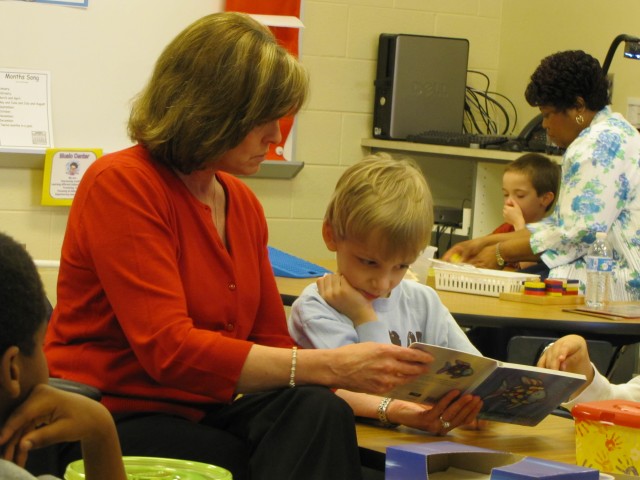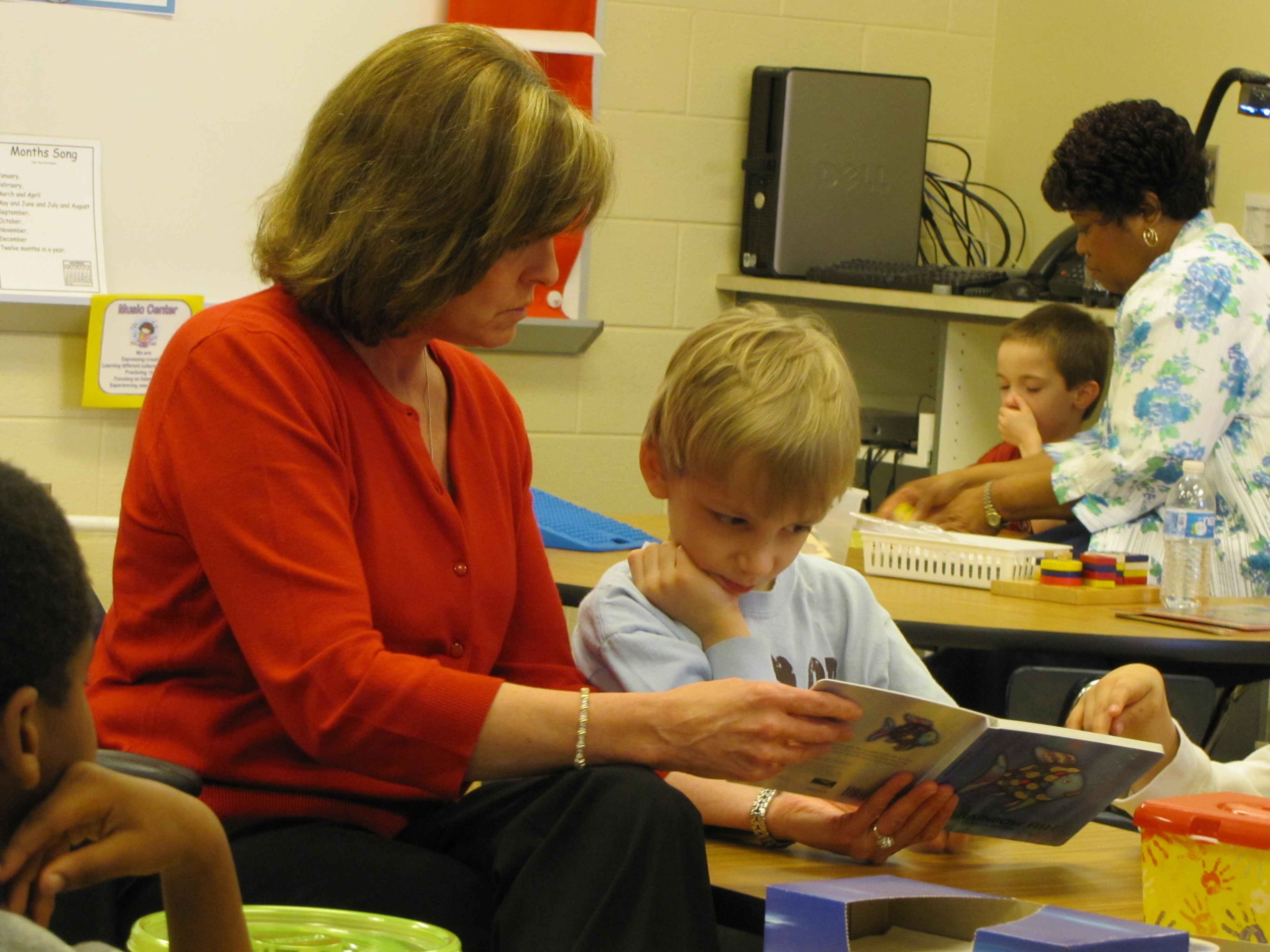
REDSTONE ARSENAL, Ala. -- In 2007, the world of Elijah Roll and his family was topsey turvey, filled with doctor's appointments, speech and behavior therapy, various medications and lots of information on alternative treatments.
And in the midst of all of that were two parents trying to understand the challenges of their 4-year-old son, who had difficulties with language and social interaction, uncontrollable temper tantrums and an inability to focus his attention on tasks.
Fast forward to 2010, and 7-year-old Elijah is now in a special education first-grade class at school, learning new language and reading skills, functioning in a group environment that is highly social by design, and making vast improvements in behavior and comprehension.
Elijah has made great strides for a child who is labeled as autistic.
Despite the antisocial behavior associated with autism, Elijah often exhibits a loving and happy nature toward his family and friends. His father, Ed Roll, a logistics management specialist with the Aviation Field Maintenance Directorate in support of the Aviation and Missile Command and a staff sergeant with the Reserve's 4/321 Logistics Support Activity on the Arsenal, is an advocate for his son. They are part of a busy household that includes mom Sandy; younger siblings Jacob, 5, Gideon, 3, and Maggie, 1; and 17-year-old sister Elizabeth, who helps to care for her brother.
For the Roll family, any signs of progress in Elijah's abilities are a blessing. They have learned to love and accept this gift of a special son. And they are part of a growing movement to gain awareness, understanding and support for this disease that now affects one in every 110 children.
"All children are special. There are always surprises with children. With a special needs child, you just hope they will progress further than they are supposed to," Roll said.
"When Elijah was 3, all the sounds he would make were grunts and moans. I prayed I'd hear my son say 'I love you, daddy.' Now, he babbles and talks on and on like any typical kid. He plays. He's imaginative. He plays with his younger sister Maggie. And he is taking on the protective role with her. When his brothers play rough, he makes sure she is OK. And that is great progress."
April is Autism Awareness Month. While national statistics show one in 110 children with autism, a 2005 Department of Defense publication indicated that one in every 88 military-connected children have autism, which comes out to more than 13,000 military-connected children living with the symptoms of the disease. In fiscal 2010, the DoD Appropriations Bill included $8 million for the DoD Autism Research Program.
Like any parents faced with the challenges of autism, Roll and his wife spent a lot of time wading through information provided by specialists, doctors and therapists. At times, the cost of therapy became daunting, especially in a household that included several siblings.
"We are so fortunate to have Elijah in a place where they have pooled a lot of special education assets into one school," Roll said of Mill Creek Elementary in Madison, where Elijah is in a class of nine special education students. "We've seen so much progress with just us working with Elijah and the wonderful teachers he has at school."
Structure, repetition, routine and the use of scripted phrases are important in the classroom. So, too, is engaging the children in reading, music, art and activities that teach them how to behave in social situations. One aspect of the classroom that may not be seen, but is always there with the students, are their parents and the enrichment and homework activities they do at home with their children to enhance the schoolroom experience, said his teacher Amy Pigg.
"The family support Elijah receives is huge," she said. "They are helping him reach his potential. He talks a lot about his family at school."
For Elijah, home interaction has been crucial to his development in the classroom.
"He has really come a long way," Pigg said. "His behavior is so much better and so is his language. Other areas are coming along now because his behavior has settled down.
"He's sounding out words. He reads a little bit at home. He has a remarkable memory. Once he gets something, he doesn't forget it. We are beginning to see a lot of social improvement with him. He's initiating play with other kids and seeking out kids instead of playing alone. At the beginning of the year, his behavior was in the way of that kind of progress."
Elijah was once known as a runner, a child who would look for a way to get away and then would run for no reason. That is no longer an issue.
Pigg said that of the nine students in her classroom, five are autistic. The other special needs first-grade class of seven students includes four autistic children.
"Over 50 percent of the kids we are seeing these days are autistic," Pigg said. "Elijah is definitely on the upper end of the autism spectrum."
Pigg said plans are to integrate Elijah slowly into the typical classroom, making sure he has the skills to work with typical first-graders.
"I see him being a productive member of society," Pigg said. "He will be able to have some independence as his judgment increases. He's such a happy, sweet natured boy that I just see good things in his future."
At home, Elijah is treated just like the other Roll children.
"We try not to focus on him as being special," Roll said. "As parents, we try to help our children reach whatever potential they have. Elijah is normal. It's just a different way of being than somebody else's normal.
"You can spend a lot of time and money on what others think are deficits. That's like throwing money down a rabbit hole that is supposed to provide a cure. But there really is not a cure for autism. We just need to help Elijah reach his potential. He will do great things in his own way."
The Roll family has received a lot of health care and emotional support from Dr. Mary Sullivan, a general practitioner in Madison and a former Army doctor who has studied autism and has developed expertise with working with parents of autistic children.
"It's so important to have a doctor who will help guide you through the autism process and make the most of your child's abilities," Roll said.
Elijah is still on a glutton (wheat) free and casein (milk) free diet. Roll is convinced the diet helps to control his son's attention and focus problems as well as digestive problems associated with autism. Elijah also takes various supplements to maintain a healthy digestive system. He attends speech and occupational therapy during the week outside of his school activities.
Although Elijah is attached to his teacher, the classroom aides and the environment itself, efforts are made to also integrate him and other autistic children with other students.
"When appropriate he goes to a typical first-grade class for some integration," Roll said. "The idea of integration was very difficult for me. But it makes a lot of sense because Elijah can learn a lot from his peers."
The term "autism" concerns a wide spectrum of symptoms that involve mostly social skills, with one end including children with minor symptoms and the other end involving children who can't function in society, and have problems with stimulation and sensory overloads.
"Elijah is somewhere in the middle. He can certainly progress and shift along the spectrum," Roll said. "We continue to hope for the best. I am not saying we have high expectations for him. He is who he is, and we love him just the same and continue to work with him."
Elijah's parents started seeing symptoms of autism in their son at about the age of 1A,A1/2, after he received his MMR (measles, mumps and rubella) vaccination. Like many parents with autistic children, they fear the vaccination could have led to the condition.
"He was developing just fine until he got the MMR shot. Then he got very sick. All his speech went away. He used to have good eye contact and would react to us," Roll said. "But after he was sick, he would just lay on the floor, looking up at the ceiling and flicking the wheels on his Hot Wheels car."
Although the MMR shot may not be the cause of Elijah's autism, Roll is concerned that the scientific community is resistant to the idea of studying the possibility.
"The rate of autism keeps going up," he said. "It's now 1 in 110 children and 1 in 85 boys. No one knows for sure what causes it. There are ideas. But there is resistance to testing those ideas."
Though Elijah's parents are active with the local support group, most of their time and energy is focused on making a happy and loving home for Elijah and his siblings. In the end, Roll thinks that is the best thing he and his wife can do for their children.
"Elijah has made us more accepting of people. We take people for who they are. But we are also less tolerant of those who pass judgment," Roll said. "I love children. We want our children to be happy. And we are very happy with Elijah's progress."

Social Sharing